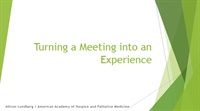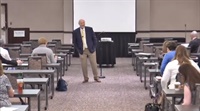
- Presenters:
- Adrian Davis | Donna Ottoviani, MSN, RN | Rebecca Parker, MD, FACEP | Hjalmer Danielson | Pia Duryea
- Duration:
- 1 Hour
- Format:
- Audio and Video
- Original Program Date:
- Jul 25, 2019
- Short Description:
- What opportunities do the various employment paradigms present? Who are these third parties that increasingly employ physicians? How can medical societies partner with these networks to better engage physicians and serve physician needs? Panel participants will discuss how their businesses recruit, retain and drive physician leadership in their organization as well as what value propositions associations can offer that meet their unique business needs.
- Price:
- $20.00 - $40.00

- Presenters:
- Heather McComas, PharmD | James Scroggs | Koryn Y Rubin
- Duration:
- 1 hour, 32 Minutes (Three Parts)
- Format:
- Audio and Video
- Original Program Date:
- Jul 27, 2018
- Short Description:
- This three-part session will focus on several parts: How Regulatory Relief is an Important Component of Tackling Physician Burnout—and what we can do about it with Koryn Rubin; Part 2: How One Medical Society Addresses Regulatory Relief and Prior Authorization with James Scroggs; and Resources and Tips to Address Prior Authorization with Emily Carroll and Heather McComas
- Price:
- $25.00 - $50.00

- Presenters:
- Jeff De Cagna, FRSA, FASAE
- Duration:
- 90 minutes
- Format:
- Audio and Video
- Original Program Date:
- Jan 07, 2020
- Short Description:
- In the third decade of the 21st century, association boards will have no choice but to confront serious challenges — including AI/automation, the climate crisis and economic inequality — that will have a profound impact on their stakeholders’ well-being. These unforgiving conditions make it crucial for boards to perform different work in a different way and at the highest possible level. In this webinar, participants will learn why the duty of foresight lives at the center of a more generative integration of stewardship, governing and foresight, and how it can inspire boards to focus their attention on understanding, anticipating and preparing their organizations, stakeholders and fields for a full range of plausible futures.
- Price:
- $0.00 - $45.00

- Presenters:
- Aletha Maybank, MD, MPH
- Duration:
- 1 Hour
- Format:
- Audio and Video
- Original Program Date:
- Aug 26, 2020
- Short Description:
- Racism is a public health issue, with significant impacts to health and well-being. Public health, healthcare professional and physicians know firsthand the impacts that long-standing discriminatory structures and institutionalized racism have on health outcomes. This has been particularly pronounced throughout the COVID-19 pandemic and documented by federal agencies including the Centers for Disease Control and Prevention (CDC). Join Aletha Mayank, MD, MPH, AMA’s Chief Health Equity Officer and Group Vice President as she discusses the roles institutions have played in fostering, exacerbating, and perpetuating racism and other forms of oppression, and how medical societies can work with members, other professionals and communities to make significant and lasting change.
- Price:
- $15.00 - $30.00

- Presenters:
- Beth Brooks
- Duration:
- 57 minutes
- Format:
- Audio and Video
- Original Program Date:
- May 14, 2020
- Short Description:
- If you are thinking of becoming a new Executive Director/CEO, or perhaps you are new to the position, this webinar is for you. First-time CEOs need to hit the ground running, tackling the many varied responsibilities and complex issues the head of an association confronts. Do these things well and you lay the groundwork for success; not so well and you might not survive to enjoy your first anniversary at the helm. Although the nuances of working in the top staff position vary from one association to the next, you can prepare yourself by understanding a number of CEO requirements, responsibilities, and expectations and skills. You will learn the importance of knowing what you are walking into, culture, working with staff, embracing good governance, and working with a Board. Beth Brooks, CAE, will tell you what to expect, and prepare for. If you are working for (or hope to work for a smaller staffed association), this is the ideal session for you).
- Price:
- $0.00 - $30.00

- Presenters:
- Mrs. Allison Lundberg
- Duration:
- 57 Minutes
- Format:
- Audio and Video
- Original Program Date:
- Jul 26, 2019
- Short Description:
- Build your annual meeting beyond your educational activities and make it a memorable experience for your attendees. Burnout is a large topic in the medical industry now, so use your annual meeting to refresh and recharge your attendees while keeping budget in mind.
- Price:
- $20.00 - $40.00

- Presenters:
- Shannon Goecke | Elizabeth Lukrich
- Duration:
- 39 Minutes
- Format:
- Audio and Video
- Original Program Date:
- Jul 27, 2017
- Short Description:
- There is no “one size fits” all approach to membership marketing. To meaningfully communicate the value of membership and drive member engagement, it is critical to identify your different member segments and understand their values and motivators. Personas – fictional characters created to represent different types of actual members – can help inform these efforts. The presenters will share their experiences synthesizing data from member surveys, censuses, and focus groups to develop member personas, as well as best practices for creating targeted messaging that raise awareness of membership benefits, encourage member participation, and increase retention.
- Price:
- $20.00 - $40.00

- Presenters:
- Michael Kumer
- Duration:
- 1 hour, 3 Minutes
- Format:
- Audio and Video
- Original Program Date:
- Jul 25, 2019
- Short Description:
- Boards often are uncertain about what to do, or how best to serve the organization. You’re in for a surprise as you learn traditional AND innovative ways that highly effective, peak-performing boards carry out their work. Leave your preconceived notions about “nonprofit” boards at the door, and dare to enter this challenging, thought-provoking, high energy event!
- Price:
- $20.00 - $40.00

- Presenters:
- Daniel E. Trucil, MA, MPH | Helen M. Fernandez, MD, MPH
- Duration:
- 1 Hour, 1 Minute
- Format:
- Audio and Video
- Original Program Date:
- Jul 26, 2018
- Short Description:
- In this session, the American Geriatrics Society (AGS) will share key learnings from its work with the FrameWorks Institute and the Leaders of Aging Organization to reframe how we all think about and act upon aging as a social construct.
- Price:
- $0.00 - $20.00

- Presenters:
- Daniel E. Trucil, MA, MPH
- Duration:
- 58 Minutes
- Format:
- Audio and Video
- Original Program Date:
- Jul 27, 2017
- Short Description:
- “What three words describe your profession?” It looks like an obvious question, but don’t be fooled. Taking time to ask—and building engagement around responses—can bolster everything from your association’s sense of belonging to your role in helping members convey what they do. This case study will explore how the AGS translated this simple question into a campaign for celebrating enthusiasm, spotlighting AGS leadership, and raising funds for our foundation (all with little-to-no budget).
- Price:
- $0.00 - $20.00
Please wait ...